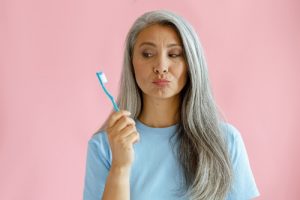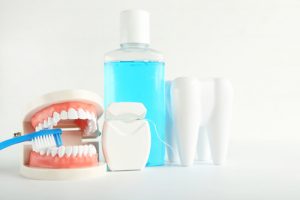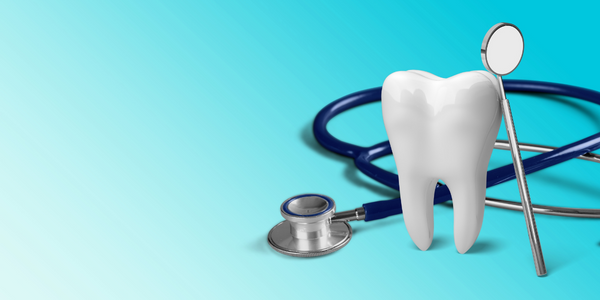It’s not a secret that menopause can mess with the body in a multitude of ways. While everyone is familiar with hot flashes and mood swings, one of the more unpleasant side effects of this hormonal change is thinning and drying out of the lining in the mouth. That lining, called the epithelium, protects your teeth from decay-causing bacteria. When it becomes dry, it often leads to an elevated risk of gum disease or tooth decay.
In menopausal women, these conditions are aggravated by a drop in women’s estrogen levels, which when at normal levels, helps to keep the gums and bones around the teeth strong. Without it, the gums can shrink away from the teeth, causing pockets of space where harmful bacteria can settle in.
When this happens, a dentist will likely find larger amounts of plaque on the teeth than earlier in life. But this thinning and buildup of plaque is not the only oral and dental complication that women may experience due to menopause, believe it or not oral health can be the victim of a number of issues due to menopausal hormone changes. Read what they are, below.
1. Burning Mouth Syndrome
“Burning mouth syndrome” is a condition that often affects women in the middle of their menstrual cycle. It’s caused when estrogen drops so low that the estrogen receptors in the mouth stop working, which causes dry mouth, irritated gums, and tooth decay. This happens because no, or little, estrogen for an extended period of time can cause a drop in saliva levels, which helps wash away food particles and keep the mouth clean.

- Brushing your teeth twice a day.
- Chewing sugarless gum.
- Drinking plenty of water, especially before going to sleep so that the mouth can replenish saliva levels around the clock.
- Check medications to see if you’re taking something that could be causing this condition, as certain medications like antihistamines and some antidepressants can cause dry mouth by reducing salivary flow.
- Chew on cinnamon sticks or use cinnamon extract in your cooking, as it’s an effective dry mouth-relief treatment.
2. Oral Thrush
Oral thrush is typically uncommon in women, most prevalent in babies, but possible after menopause and during pregnancy as fluctuating hormone levels can affect the level of Candida albicans (a naturally occurring fungus) present, potentially resulting in an overgrowth. This causes a white, soft buildup on the gums inside the mouth. Thrush may be painful and raises irritation and sensitivity inside the mouth. Common symptoms include swollen gums, bleeding gums, and a burning sensation. Oral thrush can occur without any other symptoms.
Some oral health tips to overcome this condition include:
- Go to your dentist, as you may have an infection or a tooth cavity and need to visit a dentist immediately.
- Drink plenty of water. Sipping on a glass before bedtime can help you wake up with fresh breath in the morning.
- Cut back on sugar consumption, which can trigger oral thrush due to the irritation that it causes in the mouth.
- Brush your teeth at least twice a day. For cases of severe thrush, consider using a natural desensitizing toothpaste.
3. Dry Mouth and Periodontal Disease
Putting off the dentist visit is not a good idea after menopause. As mentioned above, estrogen and progesterone decreases can decrease salivary gland production leading to dry mouth. Considered one of the most common oral complications of menopause, this (sometimes) irreversible dry mouth, can lead to tooth decay, gum disease, and cavities. If you’ve noticed that your gums appear to be receding or are swollen, red, and bleeding, or if your teeth no longer feel as strong as they used to be, your dentist will likely diagnose you with periodontal disease.
Oral health tips to overcome this condition include:
- Go to your dentist. This is the most recommended tip since your gums may be receding, and gum disease may be the culprit, even if you don’t have any periodontal disease.
- Avoid sugary drinks, as they irritate your mouth, leading to dry mouth.
- Eat foods high in B vitamins, especially if you have a history of low B-vitamin levels. A good source is a yogurt.
- Drink water throughout the day and not just when you have a dry mouth. Likewise, drinking a glass of water before bedtime can help replenish those saliva levels around the clock.
- While brushing your teeth, use a battery-powered or electric toothbrush that oscillates or pulsates to help eliminate plaque and whiten teeth, as well as a desensitizing toothpaste to reduce sensitivity and irritation.
- Instead of gum, try sugarless mints and candies, which are sugar-free and don’t cause cavities.
4. Tooth Pain
Like other menopause symptoms, the discomfort of tooth pain can be worsened or aggravated by oral dryness. Women in this age group may experience jaw pain due to nerve compression or an infection. Tooth pain can also appear as wear and tear from years of dental work. If you have this condition, talk to your dentist about dental cleaning, especially if you notice signs of wear on your teeth, such as a dulled appearance or grooves where teeth have come in too close together.

- Avoid smoking and drinking alcohol, which can increase the likelihood of developing gum disease, tooth decay, and other oral health problems.
- Brush your teeth twice a day with fluoride-containing toothpaste.
- Floss at least once a day. Flossing on each tooth’s three surfaces is essential to avoid plaque buildup.
- Visit the dentist regularly for regular dental checkups.
5. Taste Bud Changes
Women in the menopausal time of their lives may experience changes in the way they taste food. The most common changes are a tendency to taste bitter foods they may have previously enjoyed before going through menopause. Taste buds will often become more sensitive and pick up on flavors they would have otherwise not found detectable before. These taste bud changes can cause severe fluctuations in one’s appetite and cravings for certain foods. Some of these changes include a decrease in appetite, a decline in taste, a loss of ability to taste bitter foods, and the inability to detect some tastes.
Some oral health tips to overcome and navigate these changes include:
- Eat small portions at one time. This helps prevent overeating and can also help avoid meal-related bloating that can be caused by large portions of certain types of foods.
- Eat smaller meals throughout the day, especially when multiple small meals are eaten instead of several large meals. Eating too many large meals may result in weight gain due to the amount of food needed to fill a stomach that is already full.
- Avoid foods and drinks with a strong, unpleasant taste to stop cravings for those foods.
- Avoid highly sweetened foods, such as cookies, candies, and soft drinks. This can help avoid cravings for those types of foods that may increase appetite and cause overindulgence in other types of food.
6. Inflamed Gums
Gum inflammation, also known as gingivitis, is, next to dry mouth, among the most common mouth problems in menopausal women. When women go through menopause and experience changes in the estrogen levels in their bodies, the gums can become more swollen, red, and inflamed than normal. This can lead to swelling of the entire mouth and throat area, leading to an array of oral health problems resulting from inflamed or irritated gum.
Some oral health tips to overcome this condition include:
- Avoid or reduce the use of tobacco products. Tobacco can irritate the gums and cause inflammation.
- Eat fresh, wholesome foods high in B vitamins. Many of these foods have a sour, tart taste that can stimulate saliva production and help fight oral problems such as inflamed gums. Examples include avocados, tomatoes, and broccoli.
- Drink water throughout the day and not just when you have a dry mouth.
- Floss daily. If a lot of plaque is present, try to floss twice every day.
- Visit the dentist regularly for regular dental checkups.
Menopause is a normal and rather unavoidable hormonal shift. While hormonal changes may be unavoidable, oral health should not be sacrificed on account of this change; instead, issues need to be taken care of as they arise with diligence and precaution to avoid serious consequences that may develop in the future. Understanding the reasons behind these changes in oral health during menopause is important for understanding what measures need to be taken to overcome these problems and help women continue to feel their best into later years.





